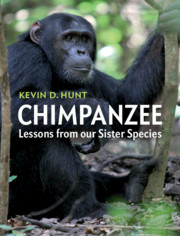Book contents
- Chimpanzee
- Reviews
- Chimpanzee
- Copyright page
- Dedication
- Contents
- Foreword
- Preface
- Acknowledgments
- 1 Sister’s Keeper
- 2 Wild Lesson
- 3 A Most Surprising Creature
- 4 Kin
- 5 Scratching Out a Living in an Unforgiving World
- 6 Guts, Glorious Guts, Large Stomach, and Colon
- 7 Thews, Sinews, and Bone
- 8 Arboreal Gathering, Terrestrial Traveling
- 9 Forged in Nature’s Cauldron
- 10 Up from the Protoape
- 11 Building a Natural Wonder
- 12 The Source of Similarity
- 13 Making Your Way in the Great Wild World
- 14 The Grim Reaper in the Forest Primeval
- 15 Powering Life
- 16 Shelter from the Storm
- 17 Meat-Seeking Missiles
- 18 The Mind of the Chimpanzee
- 19 The Brain of the Chimpanzee
- 20 Tired Nature’s Sweet Restorer
- 21 Chimpanzee Thought Transfer
- 22 Ape Implements
- 23 Wisdom of the Ages
- 24 The Daily Grind
- 25 A Nation at War with Itself
- 26 The Sporting Chimpanzee
- 27 The Passion of Pan
- 28 Into the Light
- 29 The Other Sister, Bonobos
- 30 Sister Species
- Book part
- Index
- Plate Section (PDF Only)
- References
26 - The Sporting Chimpanzee
Dominance without Destruction
Published online by Cambridge University Press: 10 July 2020
- Chimpanzee
- Reviews
- Chimpanzee
- Copyright page
- Dedication
- Contents
- Foreword
- Preface
- Acknowledgments
- 1 Sister’s Keeper
- 2 Wild Lesson
- 3 A Most Surprising Creature
- 4 Kin
- 5 Scratching Out a Living in an Unforgiving World
- 6 Guts, Glorious Guts, Large Stomach, and Colon
- 7 Thews, Sinews, and Bone
- 8 Arboreal Gathering, Terrestrial Traveling
- 9 Forged in Nature’s Cauldron
- 10 Up from the Protoape
- 11 Building a Natural Wonder
- 12 The Source of Similarity
- 13 Making Your Way in the Great Wild World
- 14 The Grim Reaper in the Forest Primeval
- 15 Powering Life
- 16 Shelter from the Storm
- 17 Meat-Seeking Missiles
- 18 The Mind of the Chimpanzee
- 19 The Brain of the Chimpanzee
- 20 Tired Nature’s Sweet Restorer
- 21 Chimpanzee Thought Transfer
- 22 Ape Implements
- 23 Wisdom of the Ages
- 24 The Daily Grind
- 25 A Nation at War with Itself
- 26 The Sporting Chimpanzee
- 27 The Passion of Pan
- 28 Into the Light
- 29 The Other Sister, Bonobos
- 30 Sister Species
- Book part
- Index
- Plate Section (PDF Only)
- References
Summary
We often hear expressions of surprise at the special status accorded athletes in our society. Why, a commentator might ask, should we look up to someone because they can hit a baseball, run exceptionally fast, or bend a soccer ball around a wall of defenders? Some find it surprising that even single events of athletic prowess can touch such a wide swath of society as to inspire an almost religious reverence.
- Type
- Chapter
- Information
- ChimpanzeeLessons from our Sister Species, pp. 449 - 457Publisher: Cambridge University PressPrint publication year: 2020



